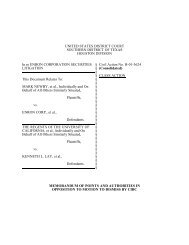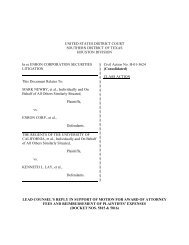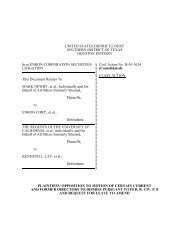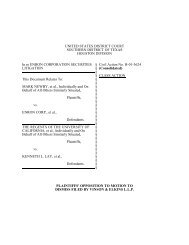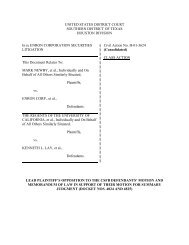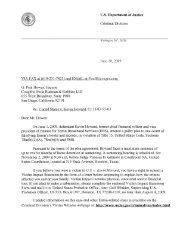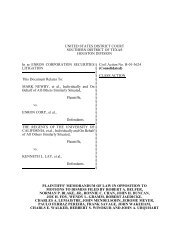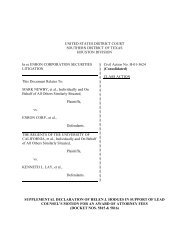Declaration Of Helen J. Hodges In Support Of Lead Counsel's ...
Declaration Of Helen J. Hodges In Support Of Lead Counsel's ...
Declaration Of Helen J. Hodges In Support Of Lead Counsel's ...
Create successful ePaper yourself
Turn your PDF publications into a flip-book with our unique Google optimized e-Paper software.
109. On August 18, 2003, The Deutsche Bank Entities filed a motion to dismiss the FACC<br />
(Docket No. 1620), which argued that, with regard to the Exchange Act claims, the FACC failed to<br />
adequately plead scienter, reliance and loss causation, and that certain of the claims were timebarred.<br />
On September 25, 2003, <strong>Lead</strong> Counsel filed Plaintiff’s Memorandum of Law in Opposition<br />
to the Deutsche Bank Defendants’ Motion to Dismiss (Docket No. 1707) (and on December 11,<br />
2003 filed Plaintiff’s Response to the Deutsche Bank Entities’ Notice of Supplemental Authority in<br />
<strong>Support</strong> of Their Motion to Dismiss the First Amended Consolidated Complaint, which concerned<br />
Deutsche Bank’s reliance on the Final Report of Neal Batson, Court-Appointed Examiner (Docket<br />
No. 1887)). <strong>In</strong> its opposition, <strong>Lead</strong> Plaintiff argued that the FACC adequately pled reliance under<br />
the fraud-on-the-market theory, that the allegations of the defendants’ structured tax deals with<br />
Enron gave a false picture of Enron’s finances which inflated the price of its securities, and that the<br />
defendants issued analyst reports concerning Enron which contained false and misleading<br />
statements. <strong>Lead</strong> Plaintiff contended also that claims concerning the tax deals were not time-barred.<br />
<strong>In</strong> the same motion, Deutsche Bank AG and Deutsche Bank Securities, <strong>In</strong>c. argued for dismissal<br />
because, with regard to the claims under the Securities Act of 1933 (“Securities Act”), the FACC<br />
failed to identify false or misleading statements in the offering memoranda, and no action was<br />
available regarding private placements. <strong>Lead</strong> Plaintiff countered that the offerings in question were<br />
public, not private. The Court, although it agreed with <strong>Lead</strong> Plaintiff that it had sufficiently pled<br />
reliance and loss causation, nevertheless dismissed <strong>Lead</strong> Plaintiff’s Exchange Act claims, because<br />
claims concerning all but one of the tax deals were time-barred. As to the Securities Act claims, the<br />
Court found that factual issues required resolution before it could rule whether the challenged<br />
offerings were actionable as public, and accordingly denied the motion to dismiss these claims. See<br />
3/29/04 Memorandum and Order re Merrill Lynch and Deutsche Bank Entities (Docket No. 2036) at<br />
91.<br />
- 64 -



